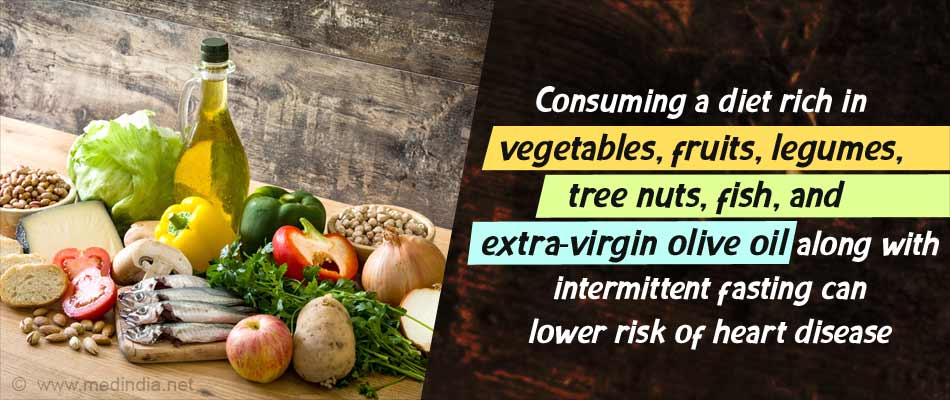
A Mediterranean diet consists of vegetables, fruits, whole grains, legumes, olives, seeds, tree nuts, seafood, olive oil, and a moderate amount of cheese and yoghurt.
‘A Pesco-Mediterranean diet rich in plant-based foods, nuts, fish and extra-virgin oil along with time-restricted fasting every 8 to 12 hours is ideal for optimizing cardiovascular health.’
Read More..
Several studies and clinical trials have indicated that a Mediterranean diet is linked with a lower risk of cardiovascular disease, cognitive decline, diabetes, depression and certain cancers.
The Mediterranean diet is also endorsed by national guidelines and 2019 ACC/AHA Guideline on the Primary Prevention of Cardiovascular Disease.
Pescatarian Diet
A pescatarian diet mainly includes fish and seafood as the primary source of protein along with plant-based foods. Consumption of poultry or red meat is reduced.
Several studies have reported that fish should be incorporated as a part of a healthy heart diet.
The 2015-2020 Dietary Guidelines for Americans recommend consumption of fish at least twice a week for adults in place of poultry, eggs and red meat.
Pesco-Mediterranean Diet
A Pesco-Mediterranean diet mainly consists of plant-based foods, nuts, extra-virgin olive oil (EVOO) and seafood.
The diet emphasizes on the use of extra-virgin olive oil as it cardiometabolic benefits like reducing bad cholesterol (low-density lipoprotein) and increasing good cholesterol (high-density lipoprotein).
Generous amounts of extra-virgin olive oil can be used in the place of butter and other fats in vegetable dishes.
The diet also includes tree nuts to provide an additional source of healthy fats and fibers.
Study Findings
The researchers performed a meta-analysis of five prospective dietary studies.
READ RELATED: Millions more face Tier 4 as Boris Johnson reveals TODAY where tougher restrictions are needed
They found that following a pescatarian diet reduced coronary artery disease mortality by 34% when compared to regular meat-eaters.
A randomized clinical trial of primary heart disease prevention, PREDIMED trial, showed that a daily serving of mixed nuts reduced heart disease risk by 28%.
Role of Dairy Products in Heart Disease
The role of dairy products and eggs in heart disease is not clear. However, they are allowed in the Pesco-Mediterranean diet.
Low-fat yoghurt and cheeses are preferred as a part of the diet. Due to a high concentration in salt and saturated fats, butter and hard cheese are discouraged.
Eggs can be a substitute for red meat as it contains beneficial nutrients. However, the researchers do not recommend the consumption of more than 5 yolks per week.
Intermittent Fasting
Intermittent fasting is a practice of limiting the daily intake of calories in a specific time window.
Intermittent fasting between 8 to 12 hours each day is beneficial for the body. It can reduce inflammation and improve insulin sensitivity by forcing the body to switch from burning glucose to fatty acids as the primary metabolic fuel.
Time-restricted eating, which limits the number of meals to two meals per day rather than three meals per day is the most common form of intermittent fasting.
Time-restricted eating reduces the calorie-consumption window. However, further research on time-restricted eating is needed.
In summary, consuming fresh whole foods along with fish has a range of cardiovascular health benefits. Following a Pesco-Mediterranean diet along with daily time-restricted eating is an ideal cardioprotective diet.
Source: Medindia
Source:









